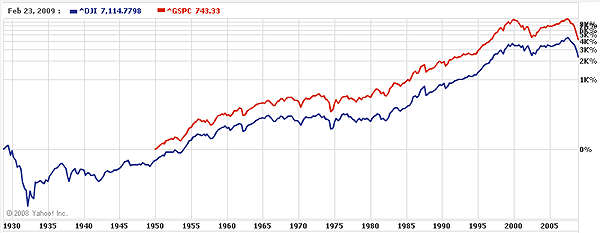Matt Yglesias is annoyed at the undue attention paid to the Dow Jones Industrial Average:
Not only is it obviously stupid for political commentators to be assessing the quality of economic policy by tracking the ups-and-downs of the stock market but the fact that the commentators who want to do this keep wanting to specifically use the Dow Jones Industrial Average just highlights their ignorance….Why not use the S&P 500? Or the Wilshire 5000?
To be clear, that wouldn’t make this idea any less dumb on the merits. But if we’re going to have stock-based punditry then it could at least be informed stock-based punditry. Back in the real world, the key issues are the trajectory of employment and income.
Clearly, the answer is that nobody makes or loses money based on betting on the unemployment rate. And we don’t have exciting video of traders going nuts on exchange floors when hourly wage numbers are announced. And anyway, all that stuff is only available on a monthly basis. You can hardly run a 24/7 cable show based on that, can you?
In CNBC’s defense, it’s worth noting that they’re just giving the people what they want. Lots and lots of fairly ordinary people have money invested in the stock market, but virtually nobody has a bunch of money invested in derivatives based on, say, the TED spread, even though right now it might be more important than the DJIA. What’s more, it’s sort of interesting just how good a proxy for the economy the Dow Jones is. Take a look at a historical chart and you’ll see that its ups and downs correlate pretty well to the overall state of the economy. If you’re looking for a sexy, fast-moving, gut-wrenching indicator of the economy’s animal spirits, you can do a lot worse than the DJIA.
And why the DJIA instead of the S&P 500? It’s the power of the first mover. The S&P didn’t get started until 1923, and even then was published only once a week. Boring! By the time they finally got around to doing things daily, the DJIA was the king of quotes, and it’s stayed that way ever since. And since the two indexes follow each other so closely anyway, I guess there’s never been any really compelling reason to switch loyalties. Plus it helps when the guys who own the average also happen to own the country’s biggest financial newspaper. That kind of synergy is hard to beat.
















